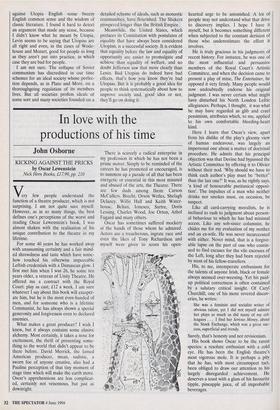BOOKS
Not such a good place
James Buchan
A WORLD ELSEWHERE by Bernard Levin
Cape, £16.99, pp. 236
Sit Thomas More's Utopia, which was written in Latin and published in Louvain in 1516. is a small book to have so interest- ed history. It purports to tell of a conversa- tion the year before in Bruges between More, his friend Peter Gilles and a Portuguese explorer named Raphael Hythlodaeus, who had travelled to the New World with Vespucci in 1504 and been among the 24 men left behind to man a fort at Cape Frio. While in the Americas, Hythlodaeus visited the island of Utopia and his detailed description of the land forms Book Two of Utopia. Later, accord- ing to Erasmus (earlier according to Bernard Levin), More prefaced the description of Utopia with an account of a visit by Raphael to Tudor England and his vigorous comments on such matters as whether the philosopher should enter royal service, capital punishment for theft, the sheep economy and the equal distribution of property.
The book is firmly rooted in the re- discovery of Greek learning of the previous century. Raphael, we are told, knows a fair amount of Latin but a very great deal of Greek — in other words, he is of a scientif- ic cast of mind. More's model for the dialogue is Plato's Republic, as he says in some verses that prefaced the first edition, but this is leavened by nonsense and trav- ellers' tales, and here the influences are Lucian and Herodotus. Throw in the New World and the communism, and you have the foundation of the Utopian tradition in Europe and America: a literary exercise in which a remote or fantastic society serves as a setting for radical political philosophy or satire.
For five centuries it has served writers well. Shakespeare must have had Utopia in mind in Gonzalo's anarchistic prospectus in The Tempest (`Had I plantation of this isle, my lord.') In his New Atlantis of 1626, Bacon created a Utopia of scientific enquiry in the South Seas. In 1773, Diderot wrote an imaginary appendix to the voy- ages of Bougainville which purported to describe free love on the island of Tahiti. By the 19th century, the world had become too well-charted to contain the island and Edward Bellamy, William Morris and Aldous Huxley and an army of writers of science fiction were obliged to locate their Utopias in the future. Meanwhile, in the course of the 18th century, the facetious- ness indispensable to More's Utopia fell away, and the word Utopia came to embrace a number of earnest social schemes worked out in fantastic detail, both on paper, as in the works of Fourier, or in practice in revolutionary Paris and among communities in the American woods. More himself, in naming his imagi- nary society Nusquam in Latin and giving its characters nonsense names, never sug- gested that the place was a practicable prospect; and already in his century, Utopi- an had the depreciatory meaning of `impracticable'. Utopia is a large subject and should be approached only with care and learning. Paradise Dreamed, by Pamela Neville- Sington and David Sington (Bloomsbury, 1993) was a good shot at it, though the book is not without eccentricities: Sade is praised as a radical feminist with progres- sive ideas, which does not entirely corre- spond with my reading of Les 120 Journees, but there's no accounting for taste. Bernard Levin's book, on which he says he has been working off and on for 20 years, is very much less coherent and I have tried to understand why.
1 think Levin's chief problem is that he ingredients and additives on the back.' — and on this one, you'll have to list the does not know Greek very well, and has misunderstood More's derivation of the word Utopia. Levin seems to think it is derived from eu and topos, which might mean 'good place'; and though this mean- ing is evident as a pun in the verses I men- tioned, More's actual coinage is from ou and topos, meaning 'no place' or, in Latin, nusquam, as is obvious from the nonsense names he gives to the characters and topography of the island.
Through this small hole in Levin's learn- ing, a sea of difficulty floods in. He takes More to task, rather unfairly, for failing to use Utopia in the correct sense:
The most striking feature of Utopia is that it is not a Utopia, if we define Utopia as a world without blemish, pain, labour or unhappiness.
In fact, we don't define Utopia as that, or rather Levin doesn't. He doesn't define Utopia at all for, in his essay, the notion embraces Werner von Braun, The Lord of the Rings, narcotics, E.T., esperanto, the Dewey system of library classifiction, P. G. Wodehouse, Oliver Sacks, the city of San Francisco, Darwin, modern pharma- ceutical research, Beatrice Webb, CND, Don Quixote, The Magic Flute, Orson Welles, children's literature, Medici Flo- rence, the Workers Revolutionary Party, non-smoking, Buddhism, Christianity, Sir Ranulph Fiennes and Dr Michael Stroud, and much of Shakespeare and Wagner. It is a wonder that it took him just 20 years; or perhaps it was the case that these things came his way over the past 20 years in his newspaper work, and he needed some theme which might unite them in a book. Unfortunately, the theme has had to be so all-embracing that it has ceased to be a theme.
The many people who like Bernard Levin's newspaper columns will surely enjoy this book. I had difficulty with it. I noticed so many errors that I lost faith even in those passages that didn't appear, to my limited knowledge, to be inaccurate. A few examples: Jus prima nocte is not Latin. Nor is quod principe placuit. Die ganzen Welt is not German. The Caped Crusader is not a successor to Batman. Joanna Southcott did not live in the late 19th century. Abel Gant did not make the film Napoleon. The Prophet Mohammed did not live seven centuries after Christ. Laurence Olivier's farewell to the theatre was not in 1968. The Shakers are not, alas, still flourishing. Ricardo did not precede Adam Smith. The golden age of Dutch painting was not the 16th century. The Apostles was not a largely political society.
On this rocky foundation, Levin opposes against Utopia English some breezy English common sense and the wisdom of classic literature. I found it hard to detect an argument that made any sense, because I didn't know what he meant by Utopia. Levin seems to be saying that Utopias are all right and even, in the cases of Wode- house and Mozart, good for people as long as they aren't put into practice, in which case they are bad for people.
I am not sure. The collapse of Soviet communism has discredited in our time schemes for an ideal society whose perfec- tion depends, as in Plato and More, on a thoroughgoing regulation of its members lives. But all societies profess ideals of some sort and many societies founded on a detailed scheme of ideals, such as monastic communities, have flourished. The Shakers prospered longer than the British Empire.
Meanwhile, the United States, which prefaces its Constitution with postulates of equality that have always been considered Utopian, is a successful society. It is evident that equality before the law and equality of opportunity are easier to promulgate and achieve than equality of welfare, and no doubt Jefferson saw that more clearly than Lenin. Bad Utopias do indeed have bad effects, that's how you know they're bad Utopias. But it is probably a good idea for people to think systematically about how to improve society and, good idea or not, they'll go on doing it.



























































 Previous page
Previous page